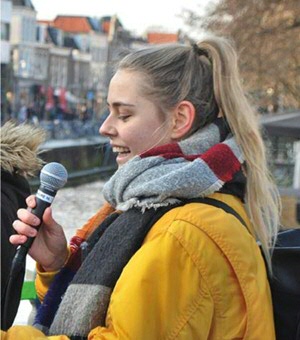Column Ester Alda H. Bragadóttir: Aanpassen in crisistijd

De afgelopen maanden hebben we een soort reality-check doorgemaakt. We zijn erachter gekomen dat ons dagelijkse leven, dat we als vanzelfsprekend beschouwden, compleet kan veranderen in een fractie van een seconde. Het dagelijkse leven dat we normaal vonden, en waarvan we hadden verwacht dat het maanden of jaren zou duren voor het zou veranderen. Opeens zaten we in crisis, en in een oogwenk was alles anders. De snelheid waarmee de crisis ons overviel maakte de ernst van de situatie vanaf het begin af aan duidelijk.
Daar staat tegenover dat een crisis die ons minder snel overvalt de problematiek kleiner en minder belangrijk doet lijken. Je zou kunnen zeggen dat er momenteel andere crises spelen die dezelfde erkenning en urgentie verdienen als deze. De aarde warmt op waar we bijstaan, maar omdat dit op langzamer tempo gaat, is het makkelijker voor mensen om het minder serieus te nemen – terwijl de opwarming juist verschrikkelijk snel gaat als je de tijdlijn van de aarde aanhoudt. Voor mensen lijkt het niet alsof de wereld van de ene op de andere dag verandert, en daarom lijkt de opwarming van de aarde niet belangrijk genoeg om ons dagelijks mee bezig te houden.
Een van de belangrijkste lessen die we hebben geleerd van deze situatie is hoe belangrijk het is om je snel aan te kunnen passen. We hebben ons allemaal aangepast door te doen wat we konden om de schade van de huidige pandemie te minimaliseren. We zijn thuis gebleven en hebben menselijk contact verminderd. Toch is dit aanpassingsvermogen niet alleen belangrijk in plotselinge situaties, waarin we snel moeten handelen. Ook in situaties waarin we de veranderingen aan zien komen en we ons dus nog op tijd aan zouden kunnen passen. Ons hierop aanpassen betekent het aanbrengen van kleine veranderingen in onze levensstijl, zodat anderen dezelfde kansen kunnen krijgen die wij ons hele leven hebben gehad. Crises dagen ons uit om flexibel te zijn, voor een hoger doel. In solidariteit met anderen. Ik geloof dat het ongewenst, of zelfs gevaarlijk is om vast te zitten in zelfgemaakt drijfzand van gewoontes en levenswijzen.
Een andere les die we hebben geleerd is voorop te stellen wat belangrijk is, en waar we om geven. Uiteindelijk zijn langzame crises net zo schadelijk voor onze levens en veiligheid als plotselinge crises. Ze brengen zelfs onze toekomst in gevaar. Nu hebben we bewezen dat verandering daadwerkelijk mogelijk is, en dat we een uitstekend aanpassingsvermogen hebben. Ik moedig ons allemaal aan om deze vaardigheden te blijven benutten. In solidariteit met iedereen die deze planeet als thuis heeft.
Dit artikel verscheen in Verbindt zomer 2020.
Ester Alda H. Bragadóttir is nu derdejaarsstudent Global Responsibility & Leadership. Ester was gedurende het studiejaar 2019/2020 studentassessor binnen van Campus Fryslân.
